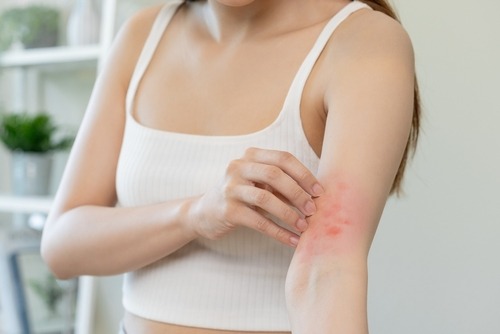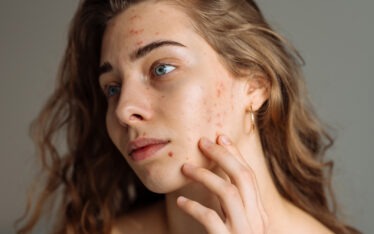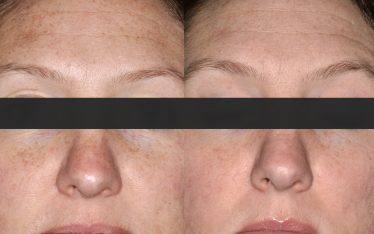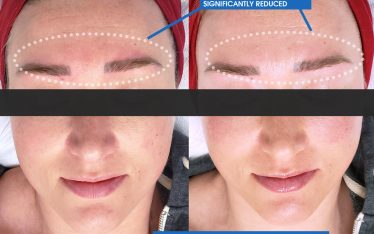How Do You Get Eczema?

In the United States, approximately 31.6 million people have one or more forms of eczema. It is estimated that 1 in 10 individuals will develop this condition at least once in their lifetime, although prevalence peaks during early childhood. There isn’t a cure for this chronic condition, but that doesn’t mean you need to let your skin dictate your life.
At Clarus Dermatology, we believe in using evidence-based medicine to deliver the highest quality of care and help our patients find the tools and treatments that work for them. This post explores what eczema is, how people get it, common treatments, and how our knowledgeable dermatology team can help when you’re struggling to find a solution.
What is Eczema?
Eczema is a noncontagious condition that affects the skin. It is characterized by redness of the skin, severe itching, oozing, and/or scaly rashes. These symptoms can range from mild to severe, with some patients with more severe cases experiencing pain.
Patients may notice ebbs and flows, with occasional flare-ups and periods of little to no irritation. These flare-ups can occur anywhere on the body and may vary drastically from one person to the next.
Types of Eczema
While atopic dermatitis is often what people think of when they consider eczema, it isn’t the only type of eczema. There are seven types of eczema:
- Atopic dermatitis is the most common type of eczema, often affecting the face, hands, feet, inner elbows, and backs of the knees.
- There are two types of contact dermatitis: irritant and allergic. This type of dermatitis often occurs on the hands due to chemicals or frequent hand washing, but it can appear on other body parts.
- Dyshidrotic dermatitis affects the hands and feet and is characterized by blisters, scaly patches, and deep cracks.
- Nummular dermatitis generally affects more men than women and shows up as round red marks on the legs, hips, lower back, backs of the hands, and forearms.
- Neurodermatitis commonly impacts the back, inside or behind the ear, sides and back of the neck, scalp, wrists, genitals, and ankles.
- Seborrheic dermatitis, commonly known as dandruff, affects the scalp but may also appear in the eyebrows, sides of the nose, behind the ears, center of the chest, and groin area.
- Stasis dermatitis often develops when the veins of the lower legs don’t return blood to the heart properly, resulting in brown stains, weeping, and skin crusting.
Symptoms of Eczema
Eczema can cause individuals to experience various symptoms, including:
- Dry, cracked skin
- Thickened, leathery patches of skin
- Rash on swollen skin
- Small, raised bumps
- Itchiness
- Oozing and crusting
- Flaky or scaly skin
- Darkening of the skin around the eyes
- Sensitive skin and rawness due to scratching
How Do You Get Eczema?
Eczema can stem from a variety of causes, so people may get it for different reasons. There isn’t one particular thing that causes all types of eczema, as each of the seven types can have different causes, resulting in the development or flare-ups of eczema.
For example, in some people, eczema is related to a gene variation that impacts the skin’s protective abilities. When the skin cannot provide protection, the weakened barrier prevents moisture retention and protection against bacteria, allergens, irritants, and environmental factors.
However, this isn’t the case for all patients with eczema. In some individuals, the condition stems from too much of the Staphylococcus aureus bacteria on the skin. The buildup of this bacteria displaces helpful bacteria and disrupts the skin’s protective barrier function.
Some individuals may experience this condition due to environmental factors and a family history of eczema. Various household items, such as soaps, shampoos, laundry detergent, fragrances in candles, and certain fabrics in clothing or sheets, can trigger eczema flare-ups in these individuals.
Treating Eczema
Treatment of eczema varies drastically based on the type of eczema you’re experiencing. For example, with atopic dermatitis, the most common type of eczema, doctors usually recommend specific instructions, including:
- Avoid scratching the irritated skin.
- Keep your fingernails short to avoid scratching the skin raw. If you scratch at night, consider wearing light gloves to protect the sensitive areas.
- Avoid anything that causes flare-ups, such as strong shampoos, laundry detergents, or candles with pungent fragrance.
- Minimize water contact with the affected area through short showers. If you prefer bathing, stick to lukewarm baths over long, hot baths.
- Keep the area moisturized with ointments like petroleum jelly. Avoid moisturizers with extra ingredients, including fragrances, dyes, scents, and alcohol.
- Use antihistamines to reduce severe itching, as prescribed by your doctor.
If you’re struggling with eczema and aren’t sure how to find relief, it’s time to talk to a knowledgeable dermatological professional with extensive experience dealing with eczema.
Get Personalized Help With Your Eczema
Dealing with eczema can be overwhelming, especially when you feel you’ve tried everything to no avail. If you’re unsure how to treat your eczema and need help finding solutions to help you be more comfortable, talk to our experienced care team at Clarus Dermatology.
We offer well-rounded care to help you find tools and strategies that work for you. We have several clinics throughout central Minnesota in convenient locations to provide the care you seek. Contact us today to book an appointment.


